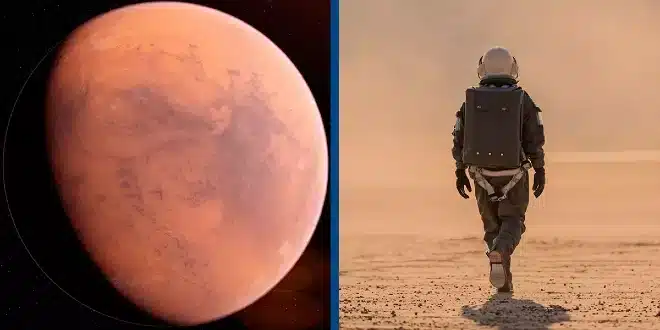Scientists are working towards establishing a human colony on Mars, with plans involving large spacecraft, sustainable life-support systems, and much more. Elon Musk aims to send people to the red planet using SpaceX’s Starship, a massive spacecraft that has already completed six tests and plans to conduct more.
However, the question remains: can humans really survive on Mars? Despite technological advancements, can these innovations protect humans from the planet’s harsh conditions, including intense radiation and a challenging environment? One of the biggest challenges will be creating suitable housing and breathable air once humans arrive. Musk hopes to make this a reality soon, but NASA believes this goal is unlikely to be achieved before the end of the next decade.
The difficulties don’t stop there. Scientists are concerned that living on Mars could cause profound changes to the human body.
Dr. Scott Solomon, a biologist, argues that humans living on Mars could undergo evolutionary changes. In his 2016 book Future Humans: Inside the Science of Our Continuing Evolution, he explores what future generations of Martian settlers might look like. His description resembles the typical image of aliens—fragile and green-skinned.
This possible transformation stems from Mars’ smaller size and its 38 percent lower gravity compared to Earth. The planet also lacks a magnetic field and ozone layer, leaving it vulnerable to constant bombardment by cosmic rays and space radiation. Solomon suggests that humans might adapt to these conditions, potentially developing a new skin pigment to protect against radiation. He even speculates that future Martians might have green skin, a result of mutation, along with weakened vision, brittle bones, and diminished muscle strength.
According to Solomon, the lower gravity on Mars would weaken muscles and bones, and the enclosed living spaces would likely lead to near-sightedness. NASA is already aware of the impact space travel can have on the human body and has been studying ways to mitigate these effects in preparation for missions to the Moon and Mars. Extended periods in space can lead to conditions like osteoporosis, where bones become fragile due to the lack of gravity.
However, experts believe that this issue is not an immediate concern, as the first humans on Mars are unlikely to survive long enough to have children. Even Musk has acknowledged that there is a significant risk involved, stating that there is a “good chance you’ll die” in the process.


